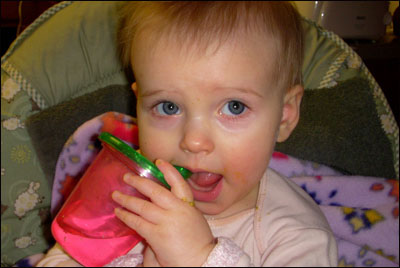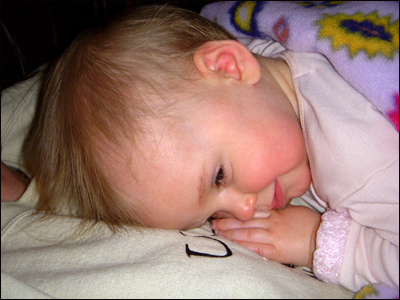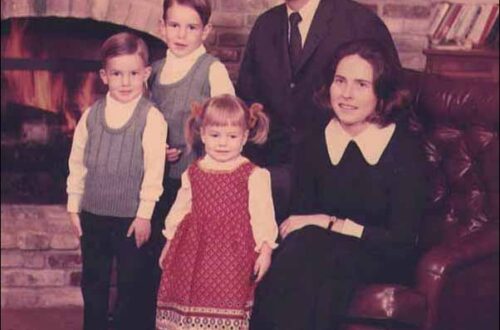
Bags under her eyes as Julia recuperates from pneumonia.
There I was, the living stereotype: the worried parent hovering over his sick child and looking down with concern and fear.
All day long Julia had not been her usual self. Her cheeks were flushed. She did not giggle or play with her parents: she laid there with a blank expression on my face. She had once become so lethargic that she could not sit up, or even hold her head up: she was like a rag doll. For the first time in her life, Julia was really sick. She had bacterial pneumonia.
Julia had particular trouble sleeping New Year’s Eve. If she lay on her back (which was her habit) to sleep, the phlegm would send her into fits of coughing. She would fling her shoulders back in an attempt to breathe more freely through the fluid in her lungs and evade the pain in her chest. I held Julia to my chest and urged her to sleep on her stomach, and she would do so for a few minutes before waking up in pain and thrashing around. Julia slept fitfully. Her breathing was shallow and labored; she made a small noise every time she exhaled, as if she were in pain, and her breathing was quicker than usual, as if she were running a race. Julia’s immune system doing what it was supposed to do, as her body was fighting all-out an infection; she woke up constantly, crying bitterly.
I sat there in the dark and worried. I watched my daughter nervously.
When Julia woke up crying I would sit up with her hugged to my chest. This would open up her lungs and allow the phlegm to move out of the nose and throat to give her temporary relief. Then I would caress and kiss Julia back to sleep as I lay back down with her flat on my chest; and this continued late into the night. I would feel her forehead that seemed to be on fire and listen to her labored breathing. Julia’s rapid breathing was punctuated by the occasional small moan. She drooled copiously on my shirt.
I worried.
I did not sleep.
I did lay there in the darkness with sick baby in my arms, waxing meditatively about how babies in the past died so often, and about how unthinkable and devastating it would be to have one’s infant child fall sick and die. I thought of how the average woman in the 19th century would give birth to five children only three whom survived childhood, and how Benjamin Franklin had suffered the pain of his son “Franky’s” early death the rest of his life — a grim and depressive New Year’s Eve it was for me, surrounded by melancholy reflections, lying there in the darkness, comforting feverish baby Julia on my chest. I felt kinship with the untold millions of fathers before me sick with worry over their ill children. How many a father had fret his brow all night just like me? Felt this horrible, dull pain in your heart as you worry?
Would she get better? Or not?
Does Julia feel my heart beat under her ear? Does my love for her help her to fight off infection? Through her delirium does she feel my loving kisses? Do they help? Does she feel the up/down swaying of my chest as I breathe? Does she even know I am here? Might she be reassured?
Is she improving? Getting worse?
We both finally fell into a deep sleep sometime after two in the morning. Julia was exhausted and I was exhausted: a typical symbol for this year. Julia never was an “easy baby.”
But there always was tenderness, attention, love, and forward progress — the next morning, the first day of that next year, Julia’s fever was almost gone. It was an auspicious start for 2008.
It would take another week, and a strong regimen of Azithromycin, to rid Julia totally of pneumonia. But that night was the turning point.

Resting on mommy’s chest.



2 Comments
Laura
Just a reach out from cyberspace (by way of New Jersey) to say hello and Happy New Year to you and yours…
Poor Julia! And mommy and daddy, too. Glad she is better. By the way, I gave up cable (no tv reception at all without it where I am) only about 6 months ago, but I couldn’t be happier to be rid of it. It took some doing to get my 16 year old son to go along with it, but he’s settled in quite nicely now.
I enjoy reading your blog so much!
Leslie
Poor baby! It’s so tough to watch your kids not feeling well. I’m glad she’s feeling better.